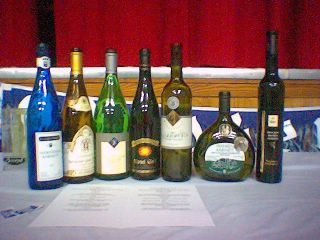The wines we had at the German Wine Society event at the German Club (from left to right in order of tasting and description below)
Last night we attended the German Wine Society of Regina's dinner and tasting at, appropriately enough for October, the German Club. The traditional Oktoberfest beverage was not in evidence, but lots of good wine certainly was, and an absolutely delicious dinner that kept us surprised and delighted all evening long.
Here are our notes on the wine, pictured, alas, only in the accompanying low-res photograph from our Audiovox Harrier (from left to right, in the order we tasted them):
Reception
Gustav Adolf Schmitt Kabinett, Rheinhessen, 2001
Margaret Anne wasn't big on this, finding it a little thin for a Kabinett. Ed tasted lots of sweet apple to begin with, but for some reason the finish was rather sour and bitter. Alice (Margaret Anne's mom, not our four-year-old daughter, who, although present at the dinner, likes her grape juice unfermented) also found it nice and fruity, but also didn't like the aftertaste.
Last night we attended the German Wine Society of Regina's dinner and tasting at, appropriately enough for October, the German Club. The traditional Oktoberfest beverage was not in evidence, but lots of good wine certainly was, and an absolutely delicious dinner that kept us surprised and delighted all evening long.
Here are our notes on the wine, pictured, alas, only in the accompanying low-res photograph from our Audiovox Harrier (from left to right, in the order we tasted them):
Reception
Gustav Adolf Schmitt Kabinett, Rheinhessen, 2001
Margaret Anne wasn't big on this, finding it a little thin for a Kabinett. Ed tasted lots of sweet apple to begin with, but for some reason the finish was rather sour and bitter. Alice (Margaret Anne's mom, not our four-year-old daughter, who, although present at the dinner, likes her grape juice unfermented) also found it nice and fruity, but also didn't like the aftertaste.
St. Ursula Niersteiner Gutes Domtal Kabinett, Rheinhessen, 2000
We all preferred this to the Schmitt; it just seemed to have more characters. Someone at the table said it was sweeter than the first one, although Ed didn't think so. His comment was that it definitely had that "gasoline" or "diesel" bouquet that is typical of some Reislings--but he meant that in a good way.
Martinshof Huxelrebe Kabinett, Pfalz, 2003
We last had this at the German Wine Society tasting at the Willow on Wascana. We adored it then, and ordered four one-litre bottles through the GWS when it put in its group order to Germany. We haven't opened one of those yet, but we will soon, because this was, without a doubt, or favorite wine of the evening (with the possible exception of the dessert choice). It had a rich, rich mouth feel and a wonderful caramel flavor. It was a perfect pairing with the appetizer. "Beautiful" was the most common comment around the table. Someone else at the event claimed the taste was rhubarb, but to us, it's unmistakeably caramel. (Ed really doesn't like rhubarb, so he would never insult a wine he enjoyed by referencing what he calls "mutated celery.")
Soup: German Mussel Chowder
Mosel Gold QBA, Mosel Saar Ruwer, 2002
The weakest wine we'd yet had. "A bit musty," said Margaret Anne. To be fair, it didn't go too badly with the soup, although it certainly wasn't as inspired a match as the Huxelrebe with the herring (and, in fact, according to Margaret Anne, who'd hung on to some of hers, the Huxelrebe went better with the soup than the Mosel Gold did).
Entrée: Pork Tenderloin in a Rye Crust with Honey German Mustard Sauce, Served on a Bed of Herbed Spaetzle with German Rosette Beets
Martinshof Cuvee Ruben Trocken, Pfalz, 2003 Frickenhauser Kapellenberg Kabinett Bacchus, Franken, 1999
The Frickenhauser Kapellenberg Kabinett Bacchus, which comes in the traditional Franken flagon-shaped bottle, smelled and tasted like pine resin. It was thin and uninteresting to both of us, and the food didn't make it any better. (To be fair, some people at the event thought it went better with the entree than the red did. We strongly disagreed.)
Dessert: German Brandied Apple Pancakes with Caramel and Chocolate Sauce
Heinheimer Kafer Ortega Sybilstein Trockenbeerenauslese (TBA), Rheinhessen, 1998
As beautiful as one would expect. Deep gold colour. Rich, buttery mouth feel. Very sweet, of course, with strong flavours of honey and raisin, but still a touch of acidity to keep it from being cloying. Margaret Anne summed it up simply: "It's a great dessert wine." Ed, who strongly believes dessert wines should be enjoyed on their own rather than trying to match them to desserts, drank his before dessert even arrived. Margaret Anne still had some of hers, and pronounced the combination of the wine and the brandied apple pancakes one of the better dessert/wine pairings she's run across.
Dessert: German Brandied Apple Pancakes with Caramel and Chocolate Sauce
Heinheimer Kafer Ortega Sybilstein Trockenbeerenauslese (TBA), Rheinhessen, 1998
As beautiful as one would expect. Deep gold colour. Rich, buttery mouth feel. Very sweet, of course, with strong flavours of honey and raisin, but still a touch of acidity to keep it from being cloying. Margaret Anne summed it up simply: "It's a great dessert wine." Ed, who strongly believes dessert wines should be enjoyed on their own rather than trying to match them to desserts, drank his before dessert even arrived. Margaret Anne still had some of hers, and pronounced the combination of the wine and the brandied apple pancakes one of the better dessert/wine pairings she's run across.
A delicious end to a delicious evening!



No comments:
Post a Comment